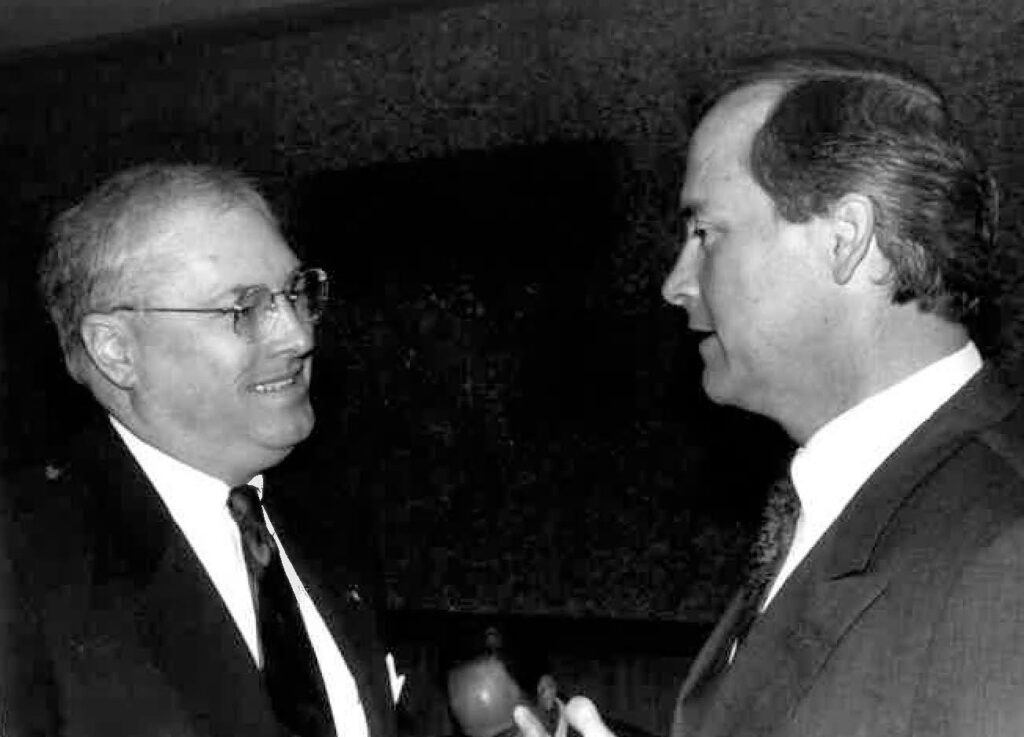Longtime Citrus Advocate Bobby McKown Talks About His Career, the Future of Citrus, and His Upcoming Induction into the Florida Ag Hall of Fame
by TIM CRAIG
When Bobby McKown got the call saying that he was selected for the 2021 Florida Agriculture Hall of Fame, the hardest part was keeping quiet.
“I knew I had been nominated, but when I got the call, I was surprised and very pleased to hear the news,” he says. “But I was told in September, so it was a little difficult to not tell anyone until the official announcement.”
The induction is another feather in the cap of a career that has seen McKown, a longtime advocate of Florida citrus, weave his way from small farm in Georgia to the boom of the Florida Citrus industry and the global political stage.
When McKown was a small child, his family moved from Georgia to Alabama, then to the Florida panhandle, where his father worked in the ship yards of Panama City. After the war, the family relocated to Winter Haven, and McKown got his first experience working with citrus by learning to bud the trees at the Glen St. Mary Nursery with rosin tape and patience.
Citrus was a cornerstone of life in Winter Haven. On Saturdays, neighborhood kids earned a little extra money picking fruit, he says. But it could get tricky.
“As a little boy, it was difficult to try to maneuver with a full 90-pound bag” he says. “Man, if you missed a rung on the ladder, you could go tumbling.”
McKown went to the University of Florida and earned a business degree, with a focus in advertising. He sold fertilizer on the west coast before coming back to Winter Haven in 1959 to work at the News Chief at the behest of then-publisher W.E. “Bill” Rynerson.
“I had known Mr. Rynerson and was friends with his son, Jack. He asked if I would come back and work at the paper until Jack got out of the Navy,” says McKown.
During his five-year stint at the paper, McKown took agriculture production classes at then-Polk Community College. “Because citrus was so dominant in Central Florida, I knew I had to be involved in that industry,” says McKown.
Growing up in Winter Haven and working at the newspaper gave McKown a local perspective of the industry. “As a young boy in the ’50s, citrus was basically a fresh fruit industry,” he says. “But when they developed a frozen concentrate juice in Lake Alfred and were able to build a stable mechanism for its production, that really changed everything.”
A freeze in 1962 nearly crippled the citrus industry. However, the growers worked together and began a quality improvement program — adjusting the ratio of juice going into the concentrate, improving the taste. The industry also hired Anita Bryant as a spokesperson and the juice market took off.
“The freeze really hurt,” he says, “but out of that, we got a better product.”
Those experiences helped land him a job as Assistant Executive Secretary for the Florida Canners Association in 1965, where he met his mentor, Warren Savant.
“Warren Savant was a tremendous mentor. He taught me so much about so many things,” he says. “including how to deal with people and relationships, and to maintain your integrity. He was the best.”
In 1975, McKown became president and general manager of the Florida Agricultural Research Institute. In 1979, he became the executive vice president and General Manager of Florida Citrus Mutual, a move that became his defining role.
At the time, Florida Citrus Mutual was struggling, with declining membership and financial struggles. McKown helped turn the organization around. He gained a reputation that and extended into the state and national stages. During the 1980s he guided the struggling industry through what he calls “three 100-year freezes.”
“The impact moved the whole industry to the south,” says McKown. “The freeze in 1989 damaged or destroyed about 90 percent of the trees. However, we were able to get Congress to start an incentive program that helped those growers destroy and helped save the industry.”
McKown’s reputation as an expert, detail-oriented negotiator earned him a place on the national and international stage. He was appointed by five presidential administrations to a multitude of trade committees, task forces, and advisory positions. He helped develop and protect the interests of the Florida citrus industry in four different international trade agreements, including the North American Free Trade Agreement (NAFTA) and the General Agreement for Tariff and Trade (GATT)
McKown retired in 1998 but has kept an eye on the industry. Greening and the consolidation of the citrus industry are two of the biggest concerns as it moves toward the future.
“I still read everything I can from trade papers, to technical papers to white papers,” he says. “We’re able to produce more per acre, but greening is really the booger. This is a worldwide problem, and it’s our biggest concern.”
The industry also is consolidating. McKown said that in the ’50s, there were thousands of small growers working together, but over time and through a variety of factors it has just changed.
“The future, in my opinion, will see larger corporate entities backed by Wall Street money,” he says. “I think they will need to continue to work collectively, because they will still be facing the issues of greening.”
Yet despite that move, there is still one thing that will need to remain central in order for the industry to thrive.
“Everything goes back to growing the citrus, and the growers,” he says. “As I went to Tallahassee, to Washington and the world, I tried to put the Florida citrus industry in the best position possible to successfully compete and thrive. I’m really proud of the things I was able to accomplish for the citrus industry.”

